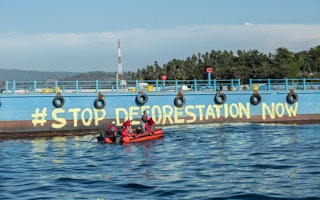Wilmar International, the world’s largest palm oil trader, has launched a new plan to weed out rainforest destruction and labour abuses from thousands of suppliers the week after environmental activists protested on its refineries in Indonesia.
To continue reading, subscribe to Eco‑Business.
There's something for everyone. We offer a range of subscription plans.
- Access our stories and receive our Insights Weekly newsletter with the free EB Member plan.
- Unlock unlimited access to our content and archive with EB Circle.
- Publish your content with EB Premium.
The Singapore-based company announced on Friday that it aims to have a no deforestation, no peat, no exploitation (NDPE) supply chain by 2020.
But non-government group Greenpeace, which protested against Wilmar last week by scaling a refinery and oil transport vessels in Sulawesi, said the company’s policy does not go far enough and lacks key commitments needed to ensure its suppliers are not clearing rainforests.
Wilmar launched a NDPE policy in 2013 after pressure from green groups, and became the first palm oil company to publish the names and locations of suppliers in 2015 in a bid to bring more transparency to a notoriously complex business.
The company’s new plan, which it has described as “ambitious”, was developed with agribusiness consultancy The Forest Trust, whose chief executive Bastien Sachet said in a statement that “a tough road lies ahead” to achieve the commitments.
Wilmar said it would pursue the plan is three ways—use satellite technology and independent verifiers to monitor land use change in its own concessions and those of its suppliers, launch a platform for assessing areas of forest vulnerable to clearing, and review how it tackles labour and community issues.
The company’s chief sustainability officer Jeremy Goon said that the plan showed Wilmar “continuing to take the lead for sustainability in the oil palm industry.”
But Greenpeace, which last month alleged in a report that Wilmar and others have been sourcing palm oil from suppliers that are clearing some of the world’s most biodiverse habitats in Papua, said the company’s plan won’t work because it suppliers are not mandated to supply maps of their concessions.
“Wilmar is trying to fob us off with voluntary agreements that its suppliers will just ignore,” said Kiki Taufik, head of Greenpeace’s global Indonesia forests campaign, who added that there is no clear deadline for suppliers to meet in the plan.
Wilmar responded that it couldn’t oblige suppliers to share concession maps on legal grounds. “Encouraging our suppliers to voluntarily share their concession maps is a first step,” the company told Eco-Business in a statement.
It added that it would be developing a process for publishing all concession maps of suppliers by January 2019. The company aims to have a NDPE supply chain by December 2020.
2020 is also that year that consumer goods giants such as Unilever, Mars and Nestlé, which buy a big share of the world’s palm oil from the likes of Wilmar, have pledged to be deforestation free.










